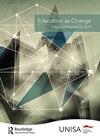Impact of COVID-19 on Self-Directed Learning: Perspectives of Rural English First Additional Language Teachers
IF 1
4区 教育学
Q3 EDUCATION & EDUCATIONAL RESEARCH
引用次数: 1
Abstract
Since the advent of the COVID-19 pandemic, there have been changes in the ways teaching and learning occur in most classrooms, including English first additional language classrooms. Teachers spent less contact class time with their English FAL learners to comply with the COVID-19 safety protocols, such as social distancing. More than ever, learners in rural schools faced the responsibility of learning independently for extended periods. The focus in this article is on how the learners’ efforts to learn independently were disrupted and how teachers assisted these learners in overcoming these challenges amid the pandemic. The article explores the impact of the COVID-19 pandemic on rural English FAL learners’ self-directed learning. The findings confirm the existence of COVID-19-induced challenges that impeded rural English FAL learners’ self-directed learning. These included a lack of motivation and a negative attitude towards self-directed learning, closure of learning facilities and a lack of learning material, overdependence on the teacher, poor physical learning environments and limited parental support. The study also reports on strategies that English FAL teachers used to enhance learners’ self-directed learning during the COVID-19 pandemic. These included strengthening home-school partnerships, providing emotional support, and simplifying learning activities. The article concludes that the COVID-19 pandemic negatively impacted self-directed learning in South Africa.COVID-19对自主学习的影响:农村英语第一外语教师的视角
自2019冠状病毒病大流行以来,大多数教室的教学方式都发生了变化,包括英语优先的附加语言教室。为了遵守COVID-19安全协议,例如保持社交距离,教师减少了与英语FAL学习者的接触时间。农村学校的学生比以往任何时候都更加面临着长时间独立学习的责任。本文的重点是学习者独立学习的努力如何受到干扰,以及教师如何帮助这些学习者在大流行期间克服这些挑战。本文探讨了新冠肺炎疫情对农村英语FAL学习者自主学习的影响。研究结果证实,新冠肺炎引发的挑战阻碍了农村英语FAL学习者的自主学习。其中包括缺乏动力和对自主学习的消极态度,学习设施关闭和缺乏学习材料,过度依赖教师,恶劣的物理学习环境和有限的父母支持。该研究还报告了英语FAL教师在COVID-19大流行期间用于增强学习者自主学习的策略。这些措施包括加强家校合作、提供情感支持和简化学习活动。文章的结论是,2019冠状病毒病大流行对南非的自主学习产生了负面影响。
本文章由计算机程序翻译,如有差异,请以英文原文为准。
求助全文
约1分钟内获得全文
求助全文
来源期刊

Education As Change
EDUCATION & EDUCATIONAL RESEARCH-
CiteScore
1.40
自引率
0.00%
发文量
29
审稿时长
24 weeks
期刊介绍:
Education as Change is an accredited, peer reviewed scholarly online journal that publishes original articles reflecting critically on issues of equality in education and on the ways in which educational practices contribute to transformation in non-formal, formal and informal contexts. Critique, mainly understood in the tradition of critical pedagogies, is a constructive process which contributes towards a better world. Contributions from and about marginalised communities and from different knowledge traditions are encouraged. The articles could draw on any rigorous research methodology, as well as transdisciplinary approaches. Research of a very specialised or technical nature should be framed within relevant discourses. While specialised kinds of research are encouraged, authors are expected to write for a broader audience of educational researchers and practitioners without losing conceptual and theoretical depth and rigour. All sectors of education are covered in the journal. These include primary, secondary and tertiary education, adult education, worker education, educational policy and teacher education.
 求助内容:
求助内容: 应助结果提醒方式:
应助结果提醒方式:


